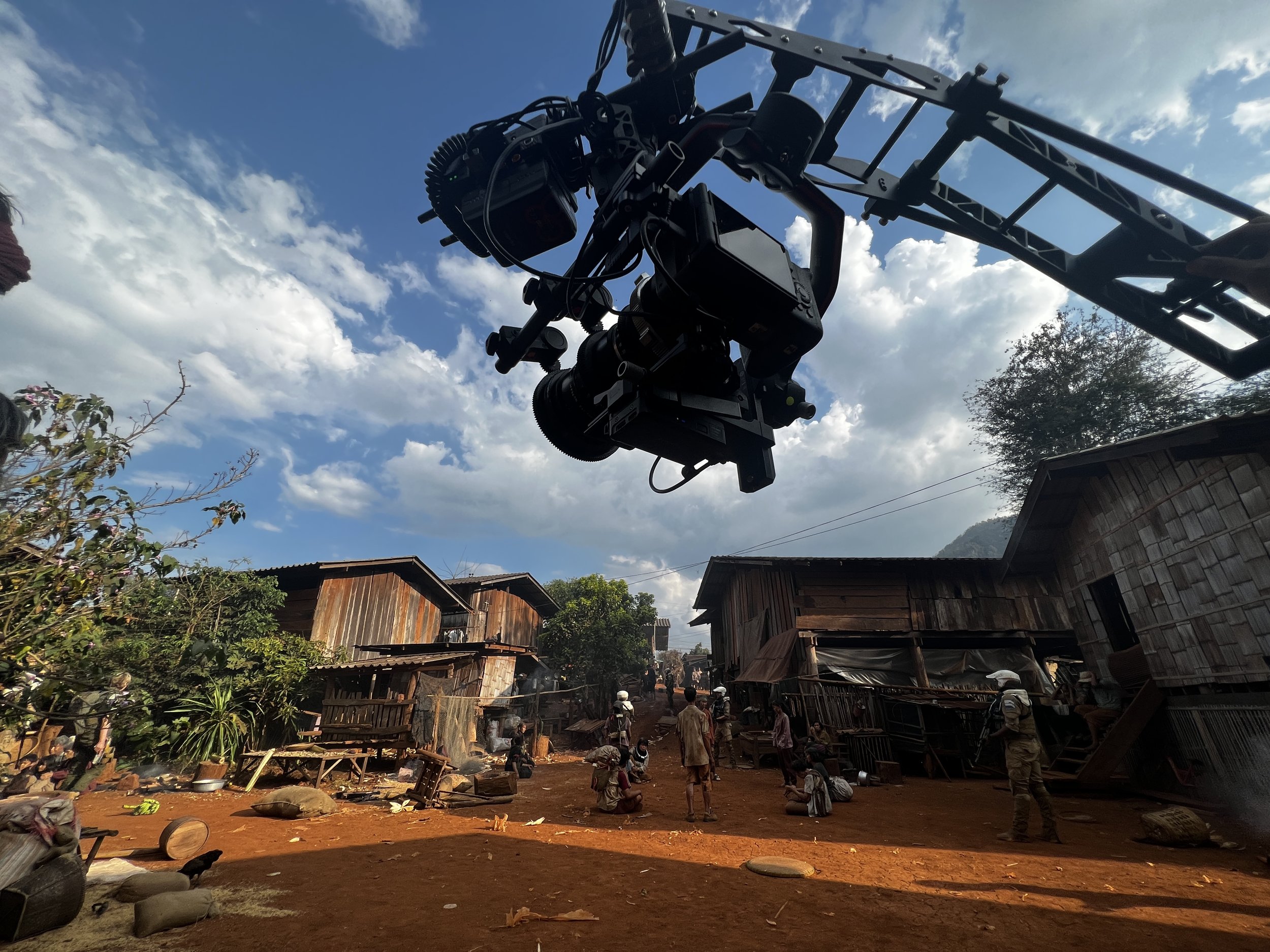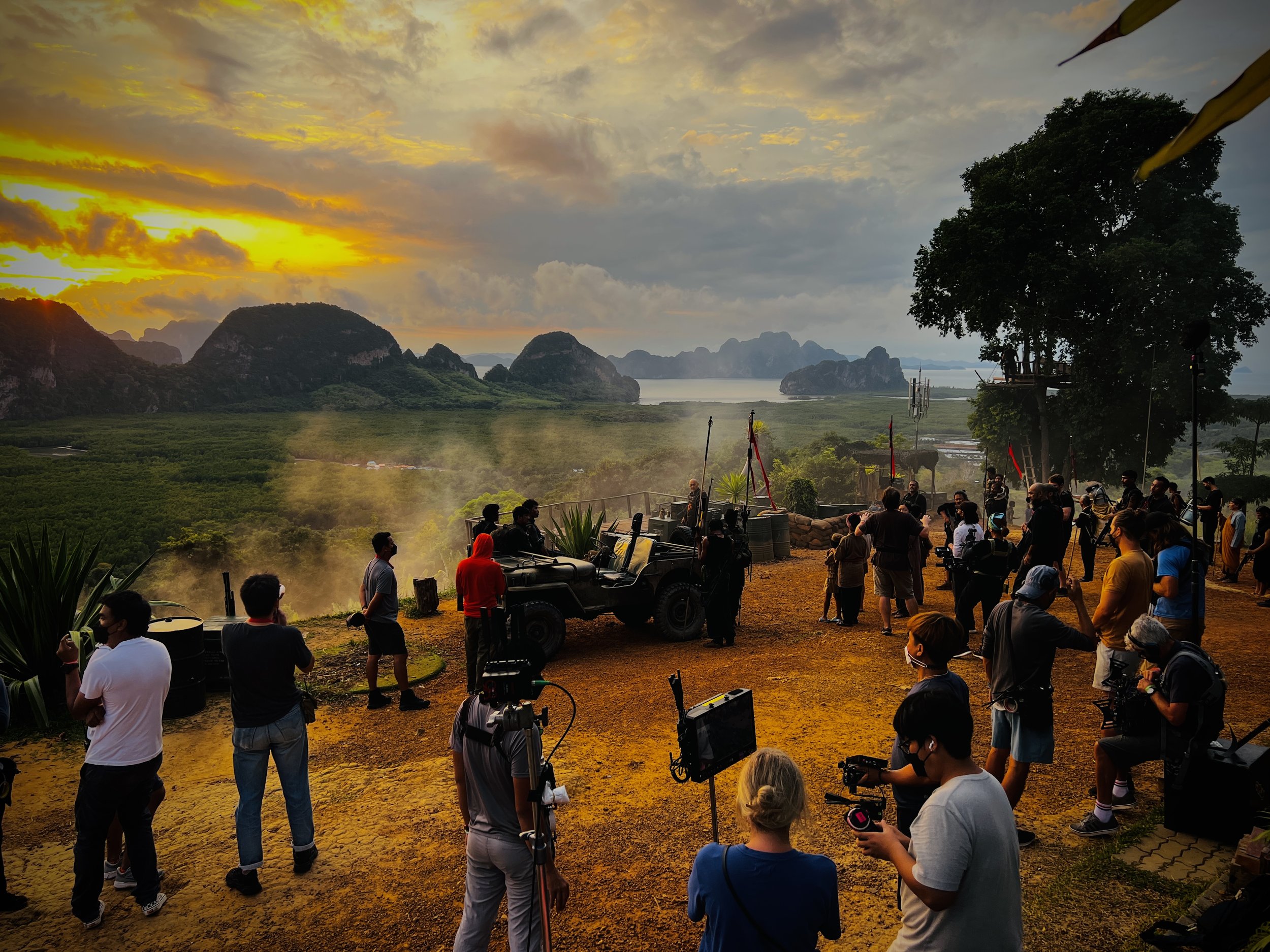My name is Oren Soffer, I'm an LA-based cinematographer. I've shot multiple feature films and shorts as well as dozens of commercials and music videos, all of which you can see on my website.






David - First off thank you so much for doing this little interview. For those who may not know can you explain what brought you to Thailand?
Oren - The Creator film shoot was looking for one country that could provide us with multiple Southeast Asian filming locales - from mountains to tropical beaches to rice paddies and the countryside to a floating village on a river bank to the big city, and Thailand had it all! Due to Covid restrictions at the time it really benefited production to stick to one country to minimize international movements, and Thailand's robust production infrastructure and great crews sealed the deal as the perfect place to shoot the bulk of our film.
David - Was there anything different about working in Thailand compared to say the US?
Oren - In some ways it was completely different and in other ways, exactly the same. One of the advantages of establishing standards of film production is that they easily replicate no matter where you are working around the world, with crews from many different countries, but the equipment and terminology is mostly the same. That said, the approach and methodology to staffing in Thailand is quite different than in the US and the West in general, with more of an emphasis on crew size and efficiency over a leaner but more spread-thin crew.
David - What small thing, on a daily basis inspired you most during your time here?
Oren - The work ethic of the Thai crew was a daily inspiration - just always happy to be there, working hard and efficiently but always with a smile and great attitudes. This creates a really pleasant and inspiring working environment. Also, the excellent food we had every day didn't hurt!
David - Is there something perhaps larger or more poignant that you took from your time here?
Oren - I think it's always inspiring to spend extended time in other countries and embed oneself in cultures that are other than one's own, and Thai culture in particular is especially warm and welcoming to outsiders which is something I definitely took away from my time there. I was just really inspired overall by the culture, landscape, and the food.
David - Was there a unique (to Thailand) challenge you faced and how did you overcome?
Oren - This isn't unique to Thailand but is certainly unique to Southeast Asia and the tropics in general - the heat and humidity were a daily challenge to deal with both physically and technologically with our camera and other equipment. One has no choice but to get used to the daily discomfort of the oppressive heat and just constantly being sweaty even just from standing around and not even doing very much physical activity - and one really learns to anticipate and appreciate the shower waiting back at the hotel at the end of the day!
David - Where was your favorite location and why? Basic yet burning question…
Oren - I think the entire crew would say that our favorite location was Railay Beach in Phang Nga Bay. We spent an entire week there including two weekends enjoying the beaches and island hopping, eating fresh seafood, and filming right on the beach. Fantastic experience overall and one of the most beautiful places I've ever been in the world.
David - In what ways did shooting here (in Thailand) on location help or hinder The Creator?
Oren - Shooting on location was imperative to our goals to imbue The Creator with a sense of tactileness and tangibility, immersing the audience in a real place that felt grounded despite being elevated and augmented with the layer of science fiction that was painted on top of the real locations in post production.
My next questions are more towards the art than of Thailand but as I did not have the pleasure of featuring you on our Visual Interviews previously, I will carry the sentiment over into this half.
David - A question I always ask is what relationship do you have with the viewer and how does that affect you when shooting? I would be curious as to the thoughts both from a DP’s perspective and from your BTS images that are in their own right visually stunning.
Oren - All forms of art, I believe, exist in a liminal balance between self-expression, and the experience of the audience - and aside from the performing arts, none more so than filmmaking. Films are really designed to be viewed and experienced by an audience, and therefore, consciously and subconsciously, every decision we make as filmmakers is ultimately designed with the audience experience in mind. In the case of The Creator, all of our technical and creative choices were specifically designed to create an experience that would feel real, grounded and immersive despite taking place in a sci-fi world; with the ultimate underlying goal of these choices being to give the audience a permission structure to identify with the characters and be swept away emotionally in their story. That is, ultimately, the goal of any film I believe - to make an audience collectively undergo an emotional experience together, an experience that reflects and reveals something about the human condition.
David - I watched an interview you did in which you mentioned the phrase “Deep Shadows” (whilst talking about Ridley Scott’s 1979 Alien) that instantly struck a chord with me, could you expand on what you mean by “Deep Shadows” and how one can accomplish such a look?
Oren - Without getting too into the technical weeds, modern digital cameras are very sensitive to light even in the shadow regions of the image, and that sensitivity often reflects itself in digital cinematography. But back in the 1970s and 80s, film stocks of that day were a lot less forgiving in the shadows, and so dark areas in the frame that were not hit by any light would show up as very deep and inky black in the final image, with no details revealed in the way that digital cameras capture. Our goal with The Creator was to imbue the film with that same visual quality in terms of the "deep shadows" and inky black levels in the film, despite shooting on digital, to harken back to the visual style of those classic 1970's sci-fi films we all grew up with and love.
David - Could you give us a photographic technique or philosophy, a tip for the reader?
Oren - The key to my personal photographic and cinematographic philosophy is simplicity - neutral lenses and simple, single-source lighting. It can get very tempting to over-complicate the lighting of a scene, but ultimately I find myself most attracted to clean and simple imagery with minimalistic lighting coming from single sources, and I carry that philosophy through much of my work.
David - Do you approach photography and cinematography the same way or do you have different philosophies for how you approach both?
Oren - Aesthetically, I approach them very much the same way! Of course logistically, they are quite different - photography is a solitary art form whereas cinematography is deeply collaborative.
David - Do you have a sentimental photo from your time here and what’s the story behind it?
Oren - I took many photos during my trip but I am always drawn to faces and the human experience in my photography - this photo of a grandmother we met during one of our scouts of a floating village in Phang Nga Bay near Krabi is one of the first photos I took during my time in Thailand, and I think really captures the beauty and the spirit of the people we met along the way.
David - Bonus question, do you have any tips on creating such visually stunning images like you did with the Sony FX3 on similar equipment, for many of us are limited to the likes of consumer grade electronics. Where is budget best used for optimum output?
Oren - The visual quality of the images on display in The Creator has nothing to do with the camera we shot on, but everything to do with the production value of the locations, costumes, props and lighting that we pointed the camera at! I think the biggest lesson to draw from that for lower budget productions is that the equipment matters so much less than what you are putting in front of the camera, and it's best to put as many of your resources as possible towards what you're pointing the camera at. Beautiful locations in particular can really go a long way.
Thank you so much for sharing your experience working here in Thailand with us Oren (as well as a sneak peek at Gareth Edwards doing his thing). For everyone reading make sure to go watch The Creator and keep up to date with Oren’s projects on Instagram and see his past work on IMDb.

